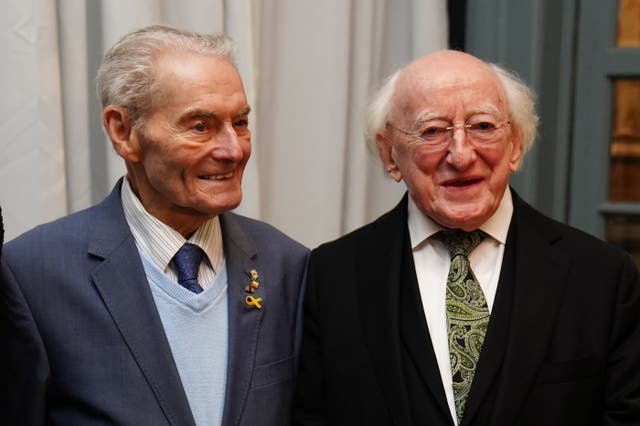Protesters removed as Irish President Higgins addresses Holocaust memorial event
Michael D Higgins emphasised the importance of education to build a peaceful future.

Protesters have been removed from a Holocaust memorial event during an address by Irish President Michael D Higgins.
It comes after some objected to the invitation to Mr Higgins to deliver the keynote address to the National Holocaust Memorial Day commemoration in Dublin on Sunday.
Survivors of the Holocaust were among the audience who gathered at the Mansion House for the event which included readings, survivors’ recollections and a recitation of the Scroll of Names featuring relatives and ancestors of Irish residents who died in the Holocaust.

But some had objected to Mr Higgins over recent remarks he made about the conflict in Gaza.
Tom O’Dowd, chairman of Holocaust Education Ireland, which organised the event, said some Jewish people were critical of this year’s invite, but others supported Mr Higgin’s seventh address to the annual commemoration.
The president emphasised the importance of education in his address to prevent another such atrocity from happening.
He also addressed the current conflict in the Middle East.
During that section of the speech, a small number of protesters reportedly turned their backs on Mr Higgins and were removed by security.
Access to the event had been limited to very few media outlets, but voices could be heard during that section of the speech in a livestream as Mr Higgins referenced the ceasefire agreement in Gaza, describing it as long overdue and that a heavy price had been paid for it.
The Irish president continued: “The grief inflicted on families by the horrific acts of October 7, and the response to it, are unimaginable. The loss of civilian life, their displacement, loss of homes and necessary institutions for life itself.
“The current agreement must end the killing, but as a matter of urgency deliver the massive scale-up in humanitarian aid which is urgently needed to save more lives. It is important that all remaining hostages are released and that all phases of the agreement are fully implemented.
“It is to be hoped that the agreement will not only bring an end to the horrific loss of life and destruction but that it will also mark the beginning of the meaningful discussions, the sustained diplomatic initiatives, which have been missing from the international community, with tragic consequences, and that it will commence a meaningful peace and security to Israel, Palestine and the greater region.”
Earlier during his keynote address Mr Higgins said the Holocaust is a foundational space, important for all of humanity.
“What people could see at the opening of the gates of Auschwitz-Birkenau was not only the dead, the emaciated, they were confront with the consequences of something that had a complex design and history, a cruelty aimed at the extermination of the Jewish population of Europe… and with them were included other categories, the disabled, Romani, those of same sexual orientation, all defined as an other, to be eliminated,” he said.
“It is important that all in each generation and political leaders are made acutely aware of not just the consequences of an attempted genocide but of the complicit actions of silence or the averted gaze of those who, by their indifference, allowed the Holocaust to be planned, prepared and to occur.”
Mr Higgins emphasised the importance of education in ethical remembrance of the Holocaust.
“It is education that can play a critical role in ensuring not only that an atrocity like the Holocaust never happens again but a basis of building a peaceful future can be made possible,” he said.
“That is why the work of Holocaust Education Ireland is so important, playing as it does a crucial role in ensuring that Ireland abides by its commitments under the 2000 Stockholm Declaration to counter antisemitism, Holocaust denial, distortion of the Holocaust facts, and xenophobia and racism in as many insidious guises through the provision of accurate comprehensive information about prejudice, discrimination, hate speech and misinformation.”
He said humanity needs to build a peaceful mindset, rather than one of war.
“It will be difficult work, but we must co-operate to envisage and deliver peace,” he said, praising Israeli and Palestinian peace activists.
“Ethical remembrance is an important resource but ethical remembrance must actively take the responsibility of addressing the sources that are seeking to stoke old divisions and bitterness.”





